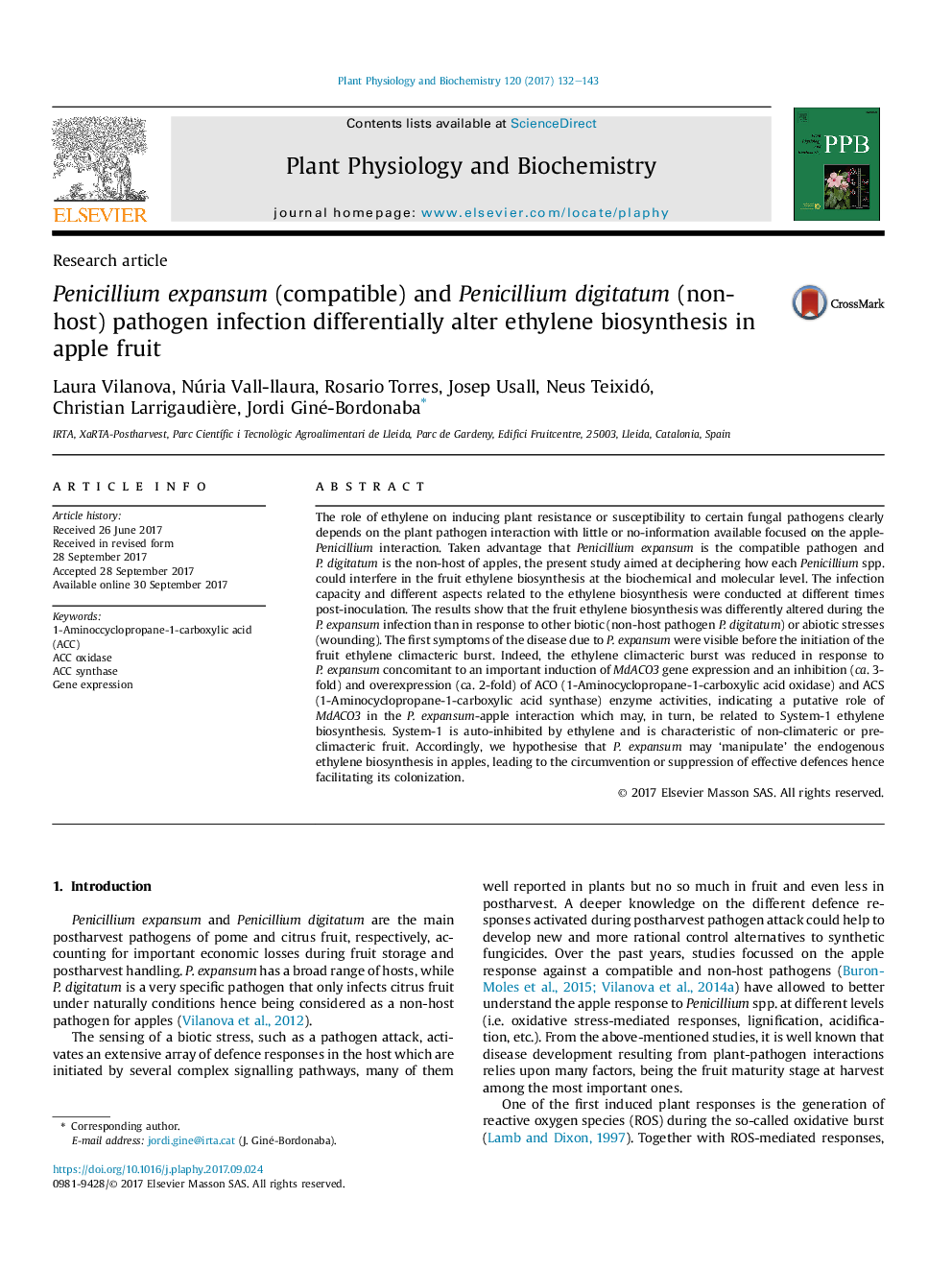| Article ID | Journal | Published Year | Pages | File Type |
|---|---|---|---|---|
| 5515274 | Plant Physiology and Biochemistry | 2017 | 12 Pages |
â¢The pathogen and the non-host pathogen differently alter ethylene production in apples.â¢Penicillium expansum modifies ethylene climacteric burst in contrast to other stresses.â¢Apples show a similar ethylene-mediated response against wounding than P. digitatum infection.â¢Infection capacity of both Penicillium spp in apples could be modulated by the apple ethylene response.â¢MdACO3 may act as a key gene in the apple-P. expansum interaction.
The role of ethylene on inducing plant resistance or susceptibility to certain fungal pathogens clearly depends on the plant pathogen interaction with little or no-information available focused on the apple-Penicillium interaction. Taken advantage that Penicillium expansum is the compatible pathogen and P. digitatum is the non-host of apples, the present study aimed at deciphering how each Penicillium spp. could interfere in the fruit ethylene biosynthesis at the biochemical and molecular level. The infection capacity and different aspects related to the ethylene biosynthesis were conducted at different times post-inoculation. The results show that the fruit ethylene biosynthesis was differently altered during the P. expansum infection than in response to other biotic (non-host pathogen P. digitatum) or abiotic stresses (wounding). The first symptoms of the disease due to P. expansum were visible before the initiation of the fruit ethylene climacteric burst. Indeed, the ethylene climacteric burst was reduced in response to P. expansum concomitant to an important induction of MdACO3 gene expression and an inhibition (ca. 3-fold) and overexpression (ca. 2-fold) of ACO (1-Aminocyclopropane-1-carboxylic acid oxidase) and ACS (1-Aminocyclopropane-1-carboxylic acid synthase) enzyme activities, indicating a putative role of MdACO3 in the P. expansum-apple interaction which may, in turn, be related to System-1 ethylene biosynthesis. System-1 is auto-inhibited by ethylene and is characteristic of non-climateric or pre-climacteric fruit. Accordingly, we hypothesise that P. expansum may 'manipulate' the endogenous ethylene biosynthesis in apples, leading to the circumvention or suppression of effective defences hence facilitating its colonization.
Graphical abstractDownload high-res image (241KB)Download full-size imageOverview of the changes in ethylene biosynthesis at both the transcriptional and biochemical level of unwounded (UW), mock (CK), P. digitatum (PD) and P. expansum (PE) inoculated apples over 72 h, represented by 3 subsequent squares each coloured according the level of fold change observed during each phase (induced/overexpressed, not affected (NA), inhibited/repressed) if compared to UW fruit at the same time period.S-AdoMet: S-adenosyl methionine; ACC synthase (ACS): 1-Aminocyclopropane-1-carboxylic acid synthase; ACC oxidase (ACO): 1-Aminocyclopropane-1-carboxylic acid oxidase; ACC: 1-Aminocyclopropane-1-carboxylic acid; MACC: malonyl-aminocyclopropane-1-carboxylic acid oxidase.
